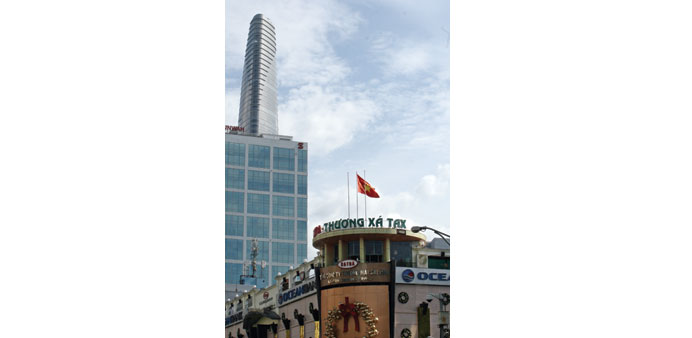The 135-year old French-built Saigon Tax Trade Centre (front) is dwarfed by the 68-floor Bitexco Financial Tower (top left), opened in 2010 at 282 metres as the tallest building in Ho Chi Minh City. PICTURE: Arno Maierbrugger
By Arno Maierbrugger
Gulf Times Correspondent
Bangkok
In a surprise development, Vietnam will eliminate caps on foreign ownership in many companies listed on the country’s two bourses, the Ho Chi Minh Stock Exchange and the Hanoi Stock Exchange. The move is meant to boost trading activity, but most of all should accelerate the lacklustre privatisation process for government-owned companies.
Until now, the Vietnam government was only willing to sell very small ownership stakes between as little as 3% and a maximum of 20% of state-owned enterprises, although the law allowed for a stake of up to 49%. For most foreign big-ticket investors, this was just not attractive enough because they would not have control over such a company in order to implement a better corporate governance environment and make Vietnam’s notoriously inflexible state operations more efficient.
The new regulation, ratified by Vietnam’s Prime Minister Nguyen Tan Dung two weeks ago, will allow overseas investors to buy or to increase holdings of voting shares in a number of industries up to 100%. The decree will take effect in September. However, the foreign investment cap in banks will remain at 30%. Other strategic sectors such as telecommunications, airlines and defence will likely also keep their investment limits.
It is also the modest activity on Vietnam’s stock markets that is putting the brakes on the privatisation process, as well as its implementation. A number of state-owned companies have been technically already privatised, but have not been listed yet, for reasons of poor accounting or other formalities. In addition, the scale of Vietnam’s stock market is still small, as is its market capitalisation of 25% of GDP in comparison to regional peers. For example, the Philippine stock market capitalisation is 65% of GDP, and Thailand’s 112%. The value of Vietnam’s stocks of $58.6bn is just about a tenth of Singapore’s $558.1bn. Not even the recent big quake at the Chinese stock markets has had much influence on Vietnam’s rather flat stock trading.
The removal of foreign ownership limits is generally seen as a major step towards open capital markets for Vietnam, and analysts now expect that more foreign investors will flock into the country and bring with them financial institutions such as private equity firms which play an important role in funding smaller companies and entrepreneurs. The value invested by foreigners in Vietnam stocks so far this year was a net $135.6mn, according to Bloomberg data, but should rise significantly with the new regulation. Investors like Chris Freund, partner at fund management firm Mekong Capital, expects “three to five times more foreign trading of Vietnamese securities” in the future, and Andy Ho, chief investment officer of VinaCapital, even sees Vietnam becoming “the most attractive Asian frontier market.”
The potential is indeed huge: According to Vietnam’s Minister of Finance Dinh Tien Dung, who drummed up business for the Vietnamese stock market at an investment conference in New York on July 1, the Vietnam government would continue equalising 289 state-owned enterprises and divesting from 300 other businesses this year.
The total value of equitised enterprises is estimated to approximate $25bn after the privatisation run, with the number of shares offered for sale amounting to $3.75bn.

